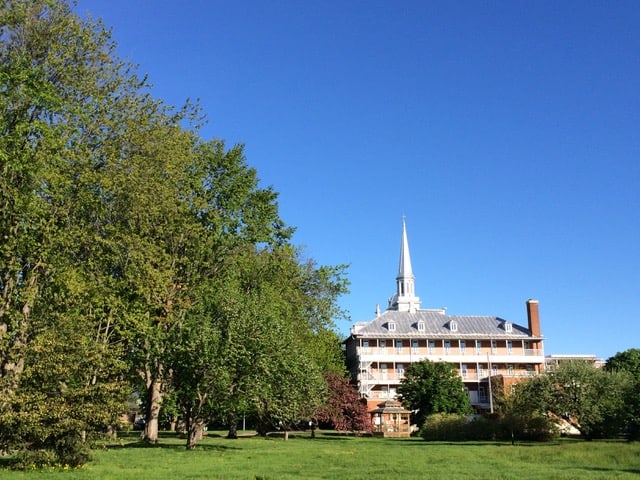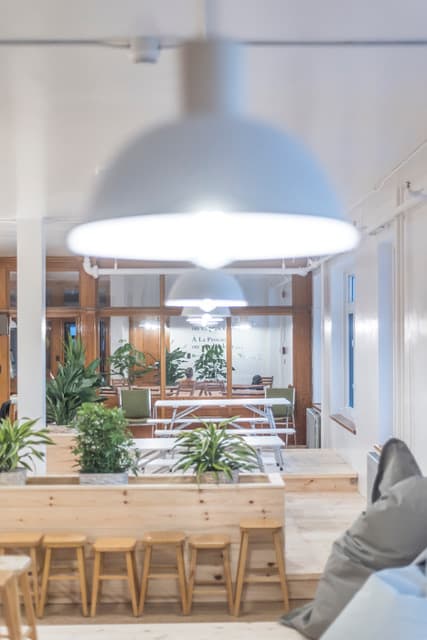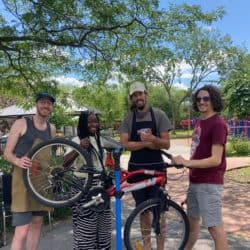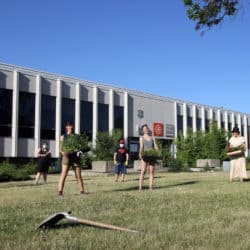Maison-Mère describes itself as a playground and an accelerator for citizen-led initiatives in Quebec’s Charlevoix region. Projects range from agri-food to alternative accommodation, art/culture/heritage, education and knowledge, co-working, and renewable energy.
Non-profits tackle big problems: poverty; inequities in health, education, and work access; sexual and racial discrimination; refugee crises; food insecurity; community development; et cetera. But a cross-cutting challenge calls for their contribution at another level: the climate crisis. In our Mission Transition series, contributor Diane Bérard examines why non-profits and civil society groups should make the socio-ecological transition a core driver of their strategy, how to do it, and how funders can help. She spoke with seven organizations with very different missions, all contributing to the transition in their own way.
A successful transition to a sustainable future will happen, in part, through bold and small individual and collective actions that take into consideration the short- and long-term effects of those choices. In our fourth Mission Transition profile, we look at Maison-Mère, an accelerator for citizens’ initiatives in Quebec’s Charlevoix region that focuses on socio-economic development.
Maison Mère (Baie-Saint-Paul, Charlevoix)
Gabrielle LeBlanc, executive director
Mission: to accelerate local projects with socio-economic benefits
What is Maison Mère?
Gabrielle LeBlanc: Maison Mère is a heritage building located in the centre of our city. For 125 years, it was home to Les Petites Franciscaines de Marie, a congregation inspired by the life of Francis of Assisi. The building is 16,000 square metres on three acres of land. The city bought it in 2017. Months of collaborative work with representatives from the social, cultural, community, economic, environmental, and political worlds allowed us to determine Maison Mère’s mission: creating opportunities for projects with a high potential for socio-economic benefits for the environment.

What is your definition of the socio-ecological transition?
GL: The socio-ecological transition will happen through bold and small individual and collective choices and actions. We can all make choices with or without thinking about their impact. We lean toward transition if we consider the short- and long-term effects of our actions and behaviour. If we don’t, we move away from a sustainable future.
How does Maison Mère contribute to the transition?
GL: We are a playground and an accelerator for citizens’ initiatives. We empower change agents to have a dual impact: through their project and by influencing other citizens to lean in. Maison Mère creates strength in numbers. And it gives the community of change agents tools to achieve results. That being said, we have circumscribed six themes for the projects we support so that they match the DNA of our territory: agri-food, alternative accommodation, art/culture/heritage, education and knowledge, coworking, and renewable energy.
Can you give us an example of how a small pandemic project had a ripple effect of strengthening your local food chain?
GL: Maison Mère includes a coworking space called La Procure. COVID-19 forced its temporary closure. La Procure members rapidly reached out to each other to keep the community alive. They came up with a food baskets project, which allowed local restaurateurs to sell their inventories, which otherwise would have gone to waste. Citizens could buy these food baskets online. But the pickup was set up in a parking lot. Local artists, who, like the restaurateurs, were struck by COVID restrictions, gave varied performances. These shows were sponsored by the art centre and the local government. The food baskets project was the stepping stone for installing a public market on the land of Maison Mère, a place where locals and tourists (a third of Baie-Saint-Paul’s economy relies on tourism) can meet and contribute to a more robust local food chain.

Maison Mère aims to bridge the past, the present, and the future, building on the values and knowledge of Les Petites Franciscaines de Marie. How does it relate to the essence of the transition?
GL: Francis of Assisi, patron of Les Petites Franciscaines de Marie, could be seen as one of the first known environmentalists. Following his principles, the nuns worked in sync with nature while building prosperity for the community. Thus, the land was cultivated by some hospital patients suffering from intellectual disabilities. This urban farm was a food supplier for the community as a social integration tool for those patients. And the land was exploited according to sustainable practices. Since 2020, one hectare has been occupied by a living lab operated by l’Institut EDS [at Laval University]. Institut EDS is responsible for creating knowledge related to sustainable development and transition. Their living lab on Maison Mère grounds aims to study the processes from which the local and regional community is likely to develop social ties and, on an individual scale, a feeling of personal strength through working the land. This is how knowledge from the past – adapted to contemporary issues – will help Baie-Saint-Paul transition to a more sustainable future. Whatever the territory, the socio-ecological transition will need to build the future trajectory on an equilibrium between the past and the present.
How is Maison Mère financed?
GL: The city of Baie-Saint-Paul has been our main financial backer. But over the last five years, we have reduced our operating costs by $500,000 while creating independent income from our coworking space, rental of what used to be the nuns’ rooms to local workers, the youth hostel, and a café.
Transition is as much about affordable housing as it is about food security. What more could Maison Mère do about the housing issue, and how? What prevents you from doing so?
GL: Baie-Saint-Paul gained 235 residents between 2016 and 2021, for a total of 7,341. Like many regions, we suffer a lack of housing and affordable housing. Maison Mère contributes to the solution by renting rooms to local workers. But those rooms are old and relatively small. And some of them are just too outdated to rent. With $2 million, we could make our spaces more comfortable and meet more demand. But this project does not fit in any boxes for financing. It is not social housing or tourism, and it is not an innovation. It is frustrating because we have the infrastructure to partly solve the housing problem, but we can’t proceed.
Maison Mère works on community change and long-term issues. But unfortunately, its impact is not easy to grasp. That can be a challenge for philanthropic foundations – I am well aware of it. In fact, I regularly struggle with the impact dilemma. I know a report on Maison Mère’s socio-economic impact would be relevant, but I don’t have the money. And the energy needed to gather the data and produce the report would not be directed to accomplishing our mission. So if a foundation is interested in our work, I would invite a member of their team to join our requalification committee. Everything we do at Maison Mère is collaborative. We are used to working with different universes, and we need more allies on our journey toward transition.

